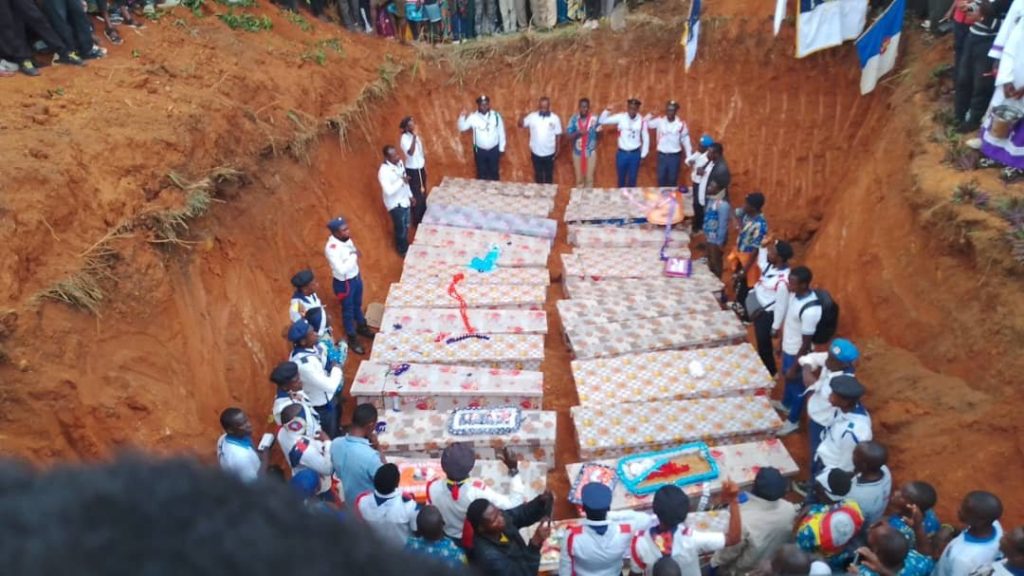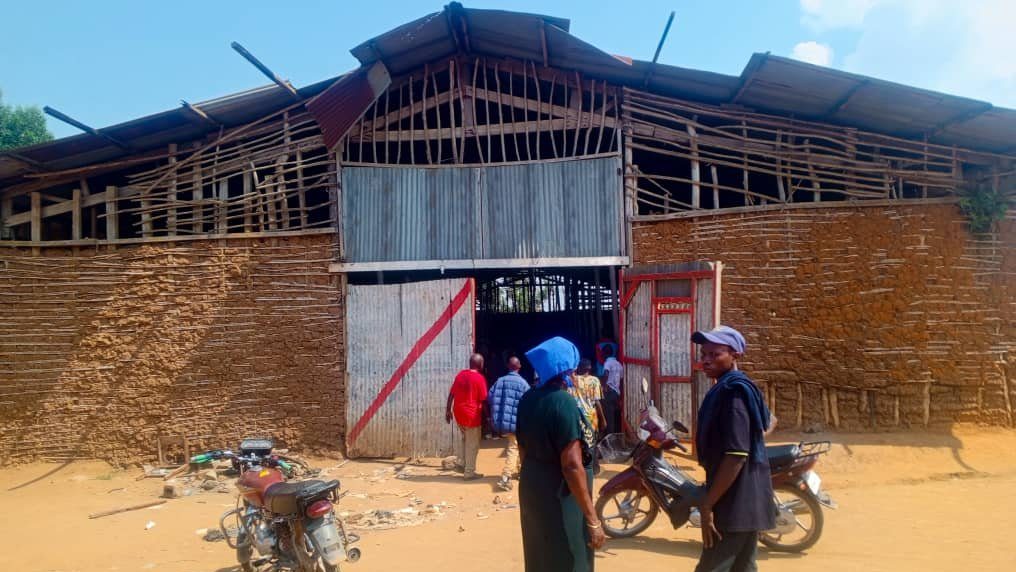At least 43 people, including children, were killed July 27 in a brutal overnight attack on a Catholic church in Komanda in eastern Congo.
Militants from the Allied Democratic Forces -- an Islamist group linked to the Islamic State group -- targeted faithful gathered for a youth retreat, opening fire and using machetes before looting homes and attacking displaced persons sheltering nearby.
The United Nations' mission in the country called the attack a "heinous" act of violence in a July 27 statement. Victims were buried in a mass grave July 28 following a funeral Mass at the Komanda church with Father Aime Lokana Dhegoin presiding.
Pope Leo expressed "deep sorrow" over the attack in a July 28 telegram, signed by Cardinal Pietro Parolin, Vatican's secretary of state, and sent to Archbishop Fulgence Muteba Mugalu of Lubumbashi, who is president of Congo's bishops' conference.
The pope joined "the mourning of the families and the Christian community," expressing his closeness and assurance of prayers.
"This tragedy invites us to work even harder for the integral human development of the wounded population of this region," the pope said.
"His Holiness implores God that the blood of these martyrs may be a seed of peace, reconciliation, brotherhood and love for all the Congolese people."
According to reports, the Allied Democratic Forces, or ADF, descended on Komanda, a township about 46 miles southwest of the city of Bunia, the capital of the province, in the early morning hours of July 27. Targeted were Catholics gathering for a retreat in the Caritas hall of the Blessed Marie-Clémentine Anuarite Nengapeta Catholic Church in the township.
The militants had ambushed the night prayer vigil, catching by surprise the youth who were preparing for the Sunday service. The armed men gunned down some of the worshippers, butchered others with machetes and abducted others.
Father Marcelo Oliveira, a Comboni missionary who has been in the Congo for many years, told the pontifical charity Aid to the Church in Need that the victims were part of a movement called Eucharistic Crusade and were participating in a prayer vigil as part of a summer holiday formation session.

"The attack occurred at around 1 o'clock in the morning. The rebels entered the church and murdered a large number of children, both inside the church building and in the compound," he said in a message sent to the Portuguese office of ACN.
Nearby homes, shops and banks were looted by the militia, who also attacked displaced people camping in the town's hospital.
"The people -- both the youth and adults -- had gathered to celebrate the jubilee of the parish church, when the attack occurred. Those who came from other regions left, but the local worshippers converged in the church hall to wait for the Sunday service," Father Justin Zanamuzi, vicar general of the Diocese of Bunia, told OSV News in a telephone interview.
"As the church, we condemn this attack in the greatest terms possible. We feel the pain of this attack."
ADF, an organization blamed for the attack, is a murderous militia group that was launched in Uganda in 1995, and currently operates in the mountainous region between Uganda and Congo. The group has been recruiting child soldiers, maiming, killing, and raping women and children. In 2019, the militant group pledged allegiance to the Islamic State and increased its attacks.
There is an ongoing joint military offensive against the group, but Father Zanamuzi explained that the militia had recently stepped up its violence and was still carrying out killings in villages and towns in the region.
The attack in Komanda, a commercial hub connecting Tshopo, North Kivu and Maniema provinces, is the latest one. The town is an easy target of the Congolese militias due to its geographical location and economic significance.
On July 26, the priest said, the militant group had earlier begun to attack villages before targeting the church gathering at night.
"I think they are everywhere now. We cannot also rule out religious motivation. They are Muslim extremists and are known to attack Christians," he said.
The Orthodox Public Affairs Committee, a New York-based global advocacy wing of Orthodox Christians worldwide, condemned the attack in Ituri, saying the members of the militant group had killed innocent worshippers during an overnight prayer vigil.
"The attackers … used guns and machetes, setting the church ablaze and slaughtering those in the pews. This was not a battle. This was a massacre of faithful in the house of God," said the committee in a statement dated July 27.
The United Nations' mission in Congo, MONUSCO, detailed the 43 killed in the church, saying they included 19 women, 15 men and nine children.
"These targeted attacks against defenseless civilians, particularly in places of worship, are not only appalling but also in violation of all human rights standards and international law," said Vivian van de Perre, deputy special representative of the secretary general in Congo in a July 27 statement.
Days before the attack in Komanda, another militia known as CODECO, the Cooperative for the Development of the Congo, had desecrated the St. John of Capistrano in Lopa, in Ituri, on July 21.
The attack on the church came a day after the Congolese army and CODECO announced an alliance to fight a new militia known as the CRP, or the Convention for Popular Revolution.
In the attack, the tabernacle was violated, consecrated Hosts spilled, the Marian shrine vandalized, and sacred and liturgical objects destroyed.
"This serious and deliberate desecration of the Catholic church in Lopa is part of a series of violent attacks announced and claimed by the CODECO spokesperson in the trading centers of Lopa and Nizi," said Bishop Dieudonné Uringi Uuci of Bunia in a July 26 statement, which also expressed great sorrow and dismay at the attack. "It can be recalled that since 2017, this militia has been responsible for numerous gruesome atrocities against Church facilities, members of the clergy, and pastoral workers."
These latest attacks are part of the deadly cycle of conflict that has unfolded for decades in the provinces of Ituri, North Kivu and South Kivu of eastern Congo, a mineral-rich region the size of Western Europe. Fueling the conflict is an intricate mix of regional politics, ethnic and national rivalries, and a fight for control of the mineral resources, according to analysts.
In the July 28 statement, ACN said: "ACN urges all parties to strive to protect civilians and places of worship in the Democratic Republic of Congo and calls on its friends and benefactors to pray for the victims of this horrific attack, and for peace to finally arrive in this African country."

